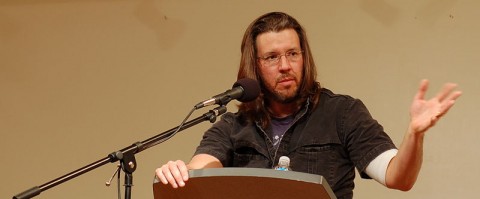In 2003, an interviewer from German public television station ZDF sat down with novelist David Foster Wallace in a hotel room. The ensuing conversation, whose raw, unedited 84 minutes (find links to the complete interview below) made it to the internet after Wallace’s suicide, remains the most direct, expansive, and disarmingly rough-hewn media treatment of his themes, his personality, and the fascinating (if at times chilling) feedback loop between them.
You can also experience this conversation in short, thematically organized clips; above, we have “David Foster Wallace on Political Thinking in America.” Wallace expresses his concerns about the strong influence of television ads on elections, which means, he says, “we get candidates who are beholden to large donors and become, in some ways, corrupt, which disgusts the voters, makes them even less interested in politics, less willing to read and do the work of citizenship.” This he sees coupled with an individualistic marketing culture which stokes “that feeling of having to obey every impulse and gratify every desire” — “a strange kind of slavery.”
But as his pained, self-questioning expression reveals — especially when it retreats into strangely endearing post-answer cringes — Wallace did not believe he possessed the cure for, or even a precisely accurate diagnosis of, a sick society. Offering social criticism at a vast remove from the avuncular condemnation of a Noam Chomsky or the raised middle finger of a Bill Hicks, Wallace discusses his fears through a novelist’s consciousness that longs to, as he explains the desire elsewhere in the interview, “jump over the wall of self and inhabit someone else.” When the interviewer tells him about her peers’ frustration at feeling educated but “not being able to do anything with it,” Wallace puts himself in the mind of students who go from studying “the liberal arts: philosophy, classical stuff, languages, all very much about the nobility of the human spirit and broadening the mind” to “a specialized school to learn how to sue people or to figure out how to write copy that will make people buy a certain kind of SUV” to “jobs that are financially rewarding, but don’t have anything to do with what they got taught — and persuasively taught — was important and worthwhile.”
Underneath Wallace’s responses rushes a current of the questions his writing leads readers to think — and think hard — about: How far has entertainment evolved toward pure anesthetic? Can we still separate our needs from our wants, if we try? Has post-Gen X irony made us not just collectively ineffectual but that much easier to sell things to? Can we ever again use terms like “citizenship” without instinctively sneering at ourselves? To the David Foster Wallace novice, these clips make for a helpful thematic primer, but the full recording (see below) will thereafter become required viewing. The interview brims with the kind of asides that make it feel like a page from the notebook of one of Wallace’s own favorite literary craftsmen, Jorge Luis Borges. Wallace wonders aloud how much of what he says will get edited out, if he can discuss his all-consuming suspicion that “there’s something really good on another channel and I’m missing it” while he’s actually on television, and how to talk to the media about how difficult it is to talk to the media while pretending you don’t know you’re talking to the media. As he admits after unpacking one particularly difficult issue, “It’s all… complicated.”
The complete interview can be viewed up top.
Colin Marshall hosts and produces Notebook on Cities and Culture. Follow him on Twitter at @colinmarshall.


